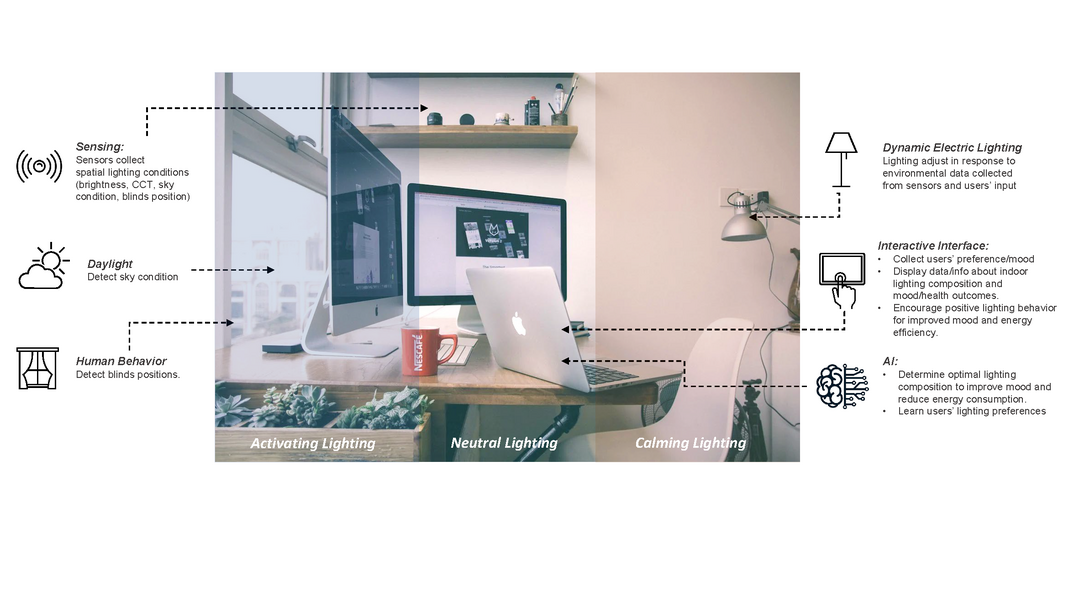PJ Dick Innovation Fund Project Grant: Leveraging AI for Equitable Lighting

Leveraging AI for Equitable Lighting: Smart and Adaptive Solutions for Healthy Environments
Azadeh O. Sawyer, Assistant Professor in Building Technology, Carnegie Mellon Architecture
In collaboration with: Niloofar Nikookar, Ph.D. Candidate in Building Performance & Diagnostics, Carnegie Mellon Architecture
Lighting design in indoor spaces traditionally remains static and unresponsive to external and internal conditions, neglecting the wellbeing of occupants and their preferences. Our research centers on the concept of “light equity,” emphasizing that lighting systems should not only provide circadian lighting for occupant wellbeing but also adapt to external and internal factors affecting human mood and perception. Historically, lighting practices have primarily prioritized task performance, disregarding their impact on human wellbeing and resulting in disparities in access to quality lighting in various office settings. This project aims to address these disparities by developing a user-centric smart lighting system that collaborates with the architectural façade to enhance mood and perception while ensuring equitable access to quality lighting in everyday spaces. Securing seed funding is critical to our research, enabling us to collect necessary data and conduct preliminary studies essential for the project's success. This seed funding will be a steppingstone towards applying for a larger NSF grant, which will provide the resources required to further develop and implement our user-centric architecturally derived smart lighting system. The project has several key objectives, including a comprehensive investigation of how specific lighting attributes, such as Correlated Color Temperature (CCT), brightness and façade systems impact human perception and wellbeing in office environments that combine natural and electric lighting. Additionally, we will develop an adaptive lighting system that works with the façade system and is tailored to individual needs and preferences.
Image: Lighting system diagram. Credit: Niloofar Nikookar
About the Project Lead
Assistant Professor in Building Technology, BPD Track Chair & CBPD Co-Director
-
Project grants support projects that address the school’s three pedagogical challenges: climate change, social justice and artificial intelligence. The grants support the diverse work of Carnegie Mellon Architecture’s faculty in creative practice, professional practice, artistic practice, funded research, participatory design, design build, curation, scholarship, critical and digital humanities, and more. The intention of the PJ Dick Project Grants Program is to provide support for a variety of projects including faculty seed funds to start a project with the aim of getting external support, to continue work on a project that may not have the option for sponsored research, and to support organizing symposia and conferences at the school.
-
The Faculty Grants Program will award a total of $400,000 over four years and is open to all full time faculty at the school. The 2024 proposals were evaluated by a committee comprised of school head Omar Khan; associate heads Joshua Bard, Mary-Lou Arscott and Kai Gutschow; Erica Cochran Hameen, Director of Diversity, Equity and Inclusion; Theodossis Issaias, Special Faculty; Jenn Joy Wilson, Assistant Dean for Research Development and Sponsored Projects; and Aaron Martin, Associate Director, Institutional Partnerships, College of Fine Arts.
The Faculty Grants Program, established in 2023 by PJ Dick Trumbull Lindy Group, supports faculty research and teaching innovations that address the school’s three pedagogical challenges: climate change, social justice and artificial intelligence. The proposals were assessed on their impact in furthering a faculty member’s research and teaching, their contribution to interrogating the school’s challenges, and their viability to garner further research support, make an impact on the discipline and expand the pedagogy of the school.
